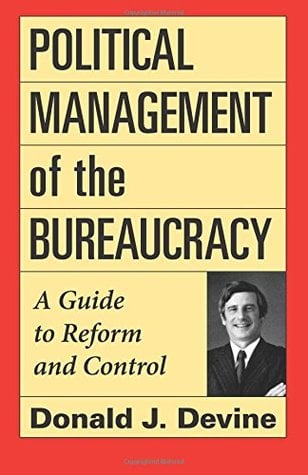“Drain the swamp!” Donald Trump declared in every campaign speech of 2016. He meant, of course, the Swamp of Washington, D.C., home of the labyrinthine network of centralized bureaucracies that control our lives. It’s also called the Deep State and the Permanent Bureaucracy.
Democrats Bill Clinton and Barack Obama as well as the two Republican George Bushes vastly increased the size and noxious powers of the Swamp. Trump is the first president since Ronald Reagan left office in 1989 who has worked to get government out of our lives. Political Management of the Bureaucracy: A Guide to Reform and Control, by Donald J. Devine, who was director of the Office of Personnel Management during Reagan’s first term, explains how to pump out the brackish water and exterminate the mosquitoes. The Gipper said of him, “Devine took on with vigor and determination one of the toughest, most important challenges we faced.” Devine’s success was “measured in billions of dollars of budget savings.” The book under review is a revised edition, for the Trump Era, of Devine’s 1991 book.
I was resident in the Swamp as a young journalist during the mid-1980’s and remember very well the battles my conservative pals in government waged against the permanent bureaucracy and the “Bushie” appointees the Vice President finagled into the government. No conservative should suppose fighting excessive government will be easy, nor that everyone on “our side” will help us.
The key to the book, and Devine’s success, is found in Chapter Five, “Reagan’s Leadership.” Devine scorns the “smart guys” and the “neutral experts” who always end up clawing their way to the top in the West Wing. Devine, who began his career as a professor of government (his specialty was the Federalist Papers), notes that the Chief Executive has to deal not only with the other two branches of government, but also with the extraconstitutional bureaucracies that resist all attempts at reforms.
“Certainly, the president has powers too,” Devine writes. “But to lead successfully, and at the same time not be tyrannical,” he needs to rely on “the power to persuade.” That depends “upon his ability to exercise rather the skill of moral leadership than the tactics of force.” Reagan was the Great Communicator. Even liberals marveled at how he could, on such issues as taxes and standing up to the Soviets, persuade Americans of the rightness of his position, thus putting pressure on Congress.
Trump obviously has a different management style, one of tweets and bombast; it seems to be working. And as Ann Coulter has observed, every time Trump swerves from the campaign themes that won him the Oval Office, he doesn’t do well; when he sticks to the work the American people elected him to do—cracking down on illegal immigration and draining the swamp—he succeeds very well.
Devine details the practical actions necessary to complement inspired leadership. He urges particularly that private-sector solutions be pursued as much as possible. He contrasts “[T]he ability to create an environment in which leaders could make decisions and act” with governmental “bias in favor of inaction,” and encourages reformers to “go beyond simple data or analytical reasoning and rely on experienced-based, good commonsense intuition.” Bureaucracies at all levels are adept at multiplying “studies” and “reports” of hundreds, even thousands of pages to ensure that reform is stymied. “The Reagan management team,” Devine says, worked hard to stunt “the growth of supervisory staff” with “efficient staff-control mechanisms.”
Devine is an admirer of Peter Drucker, who “suggested that each time staff demanded a new task, it should be forced to abandon an old one.” However, he cautions that “Government is not the same” as private business. The private sector, which depends on profit for its survival, is always in danger of liquidation, while it is nearly impossible to expunge even the most minor government program. Oddly, government “managers don’t manage. Government executives are first and foremost representers—salesmen of ideas and rhetoric, and defenders of programs and jurisdiction.” They spend an incredible amount of time on such things as giving speeches and testifying before Congress. Additionally, “There are no politically neutral decisions.” Dismissing a bureaucrat means problems with a government union; cutting a welfare benefit brings trouble upon a congressman.
“Politics is policy,” we conservatives always said during my Washington days. It sure is. If you know someone in the Trump administration, give him a copy of this book. And let’s hope it’s read by the Chief Executive himself.
[Political Management of the Bureaucracy: A Guide to Reform and Control, by Donald J. Devine (Ottawa, IL: Jameson Books, Inc.) 188 pp., $8.95]



Leave a Reply